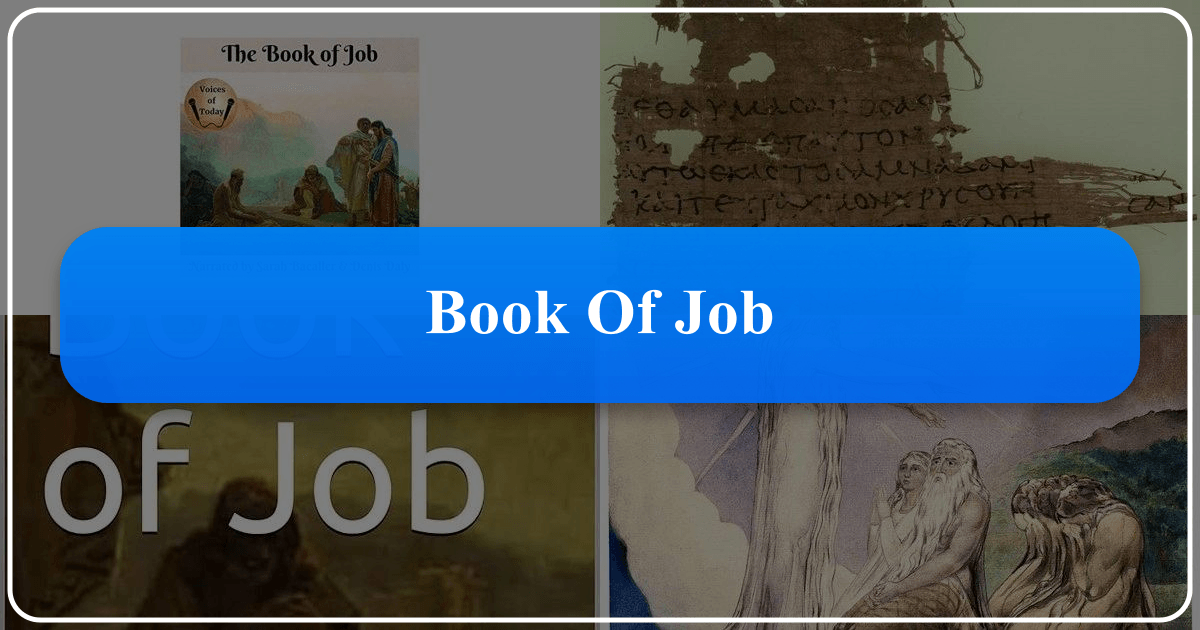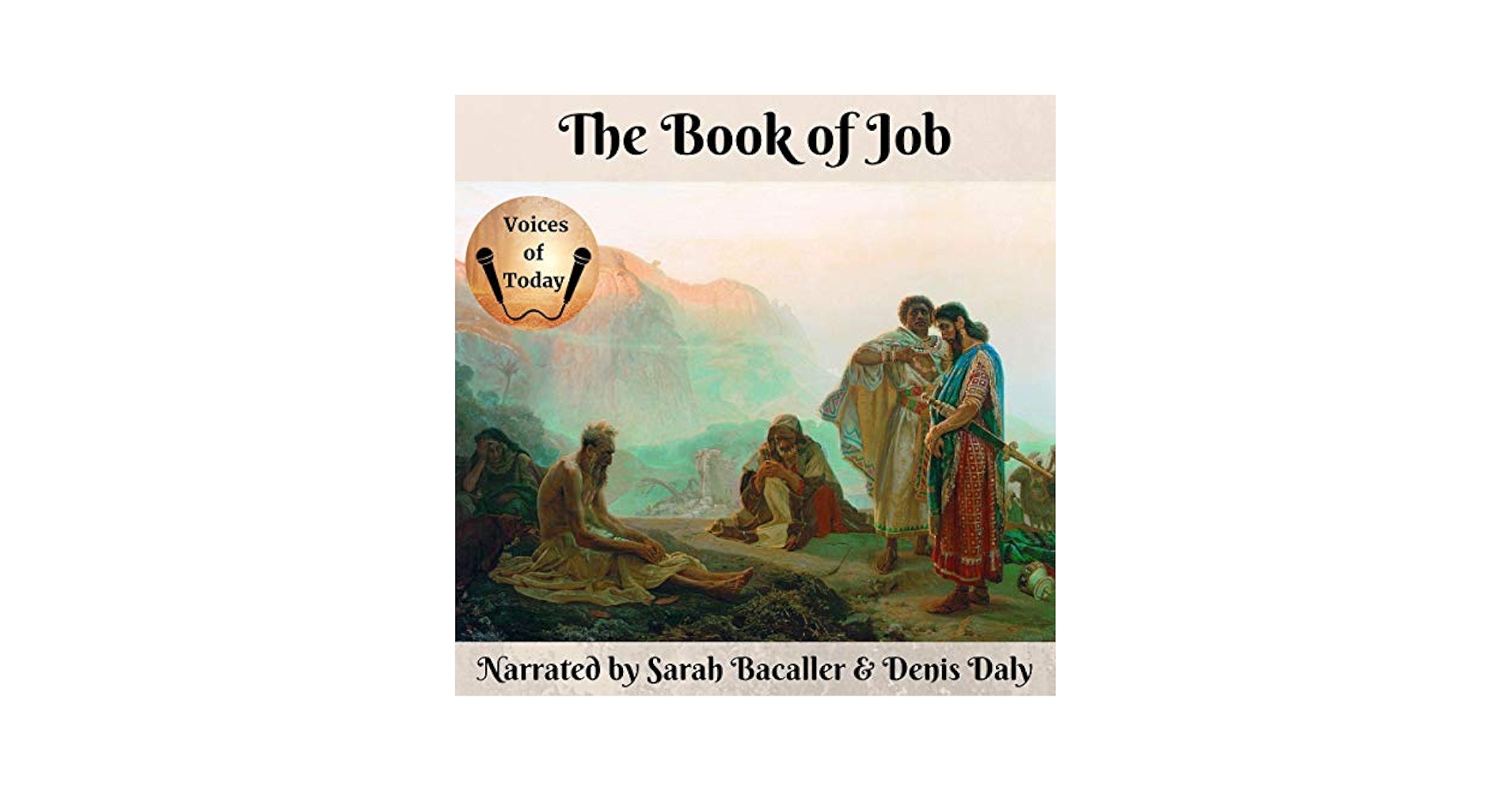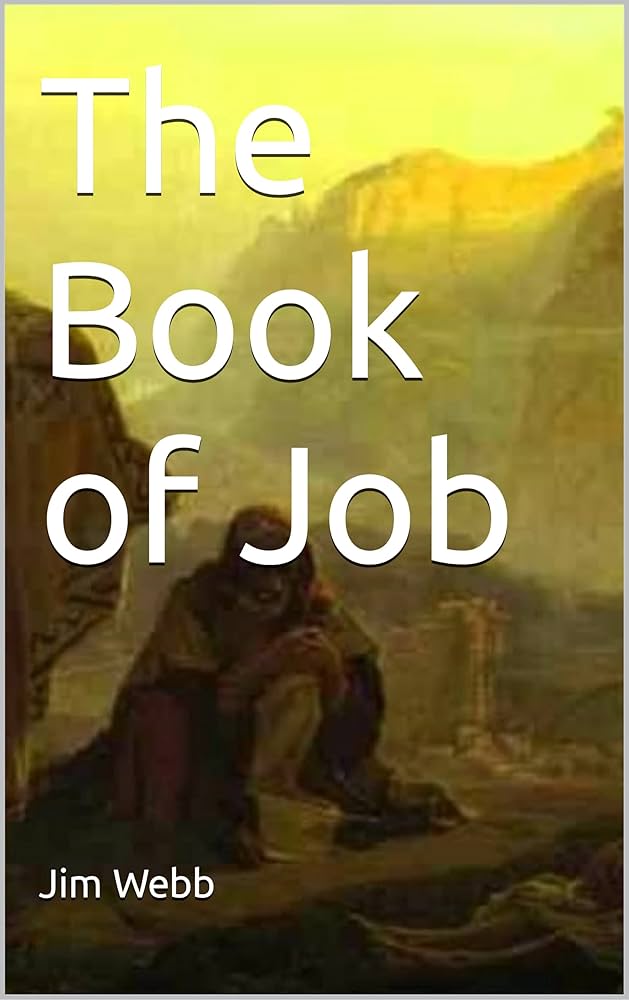The Book of Job: A Multifaceted Exploration Across Genres and Interpretations

The Book of Job, a cornerstone of religious and philosophical discourse, continues to captivate readers centuries after its composition. Its enduring appeal stems from its exploration of profound themes: suffering, justice, faith, and the nature of the divine. This exploration delves into the Book of Job, examining its literary features, theological implications, and lasting cultural impact through the lens of various genres and perspectives.
The Book of Job: A Literary Analysis
The Book of Job defies easy categorization. It’s not simply a narrative; it seamlessly blends various literary genres to create a complex and compelling tapestry. The structure itself is noteworthy. It begins with a prologue (chapters 1-2), setting the stage for the dramatic conflict between God and Satan over Job’s unwavering faith. This prologue establishes Job’s piety and the wager between the divine and the adversarial force. The wager sets the stage for Job’s subsequent trials, presenting a clear narrative arc.
Following the prologue, the narrative shifts to a poetic dialogue (chapters 3-31). This section comprises a series of speeches and debates between Job and his three friends. Job, overwhelmed by suffering, grapples with his predicament, questioning God’s justice and the meaning of his ordeal. His friends, attempting to offer consolation, propose that his suffering is a consequence of hidden sin. However, their arguments fail to alleviate Job’s pain, leading to a prolonged and intense exchange of ideas. The poetic language employed here adds to the work’s emotional depth, using vivid imagery and metaphors to convey the intensity of Job’s suffering and the complexities of his spiritual struggle. The use of poetry enhances the dramatic tension, creating a powerful and memorable reading experience.

The poetic dialogue culminates in Job’s powerful monologue (chapters 27-31), where he forcefully defends his innocence and challenges God’s apparent injustice. This monologue marks a turning point, shifting from the back-and-forth debate to a more personal reflection from Job.
The narrative then transitions to a second, shorter section of prose (chapters 32-42). Elihu, a younger man not previously involved in the debates, offers his perspective, adding another layer of complexity to the theodicy presented. Finally, God intervenes directly in a series of powerful speeches (chapters 38-42), reminding Job of the vastness of creation and the limitations of human understanding. Job, humbled by God’s response, accepts his own limitations and submits to divine wisdom. The epilogue, a prose section, depicts God’s restoration of Job’s fortunes and the reconciliation of Job with his friends, creating a sense of closure and hope. It also resolves the narrative tension and thematic challenges that have persisted throughout the dialogue sections. The work’s conclusion, although seemingly straightforward, prompts further reflection on the unanswered questions of suffering and divine justice.
The blending of these genres—prose narrative, poetry, and dialogue—gives the Book of Job a unique and dynamic quality. It allows for both a clear storyline and the exploration of complex philosophical and theological ideas.

Genres within the Book of Job
- Prose Narrative: The prologue and epilogue are written in prose, providing a narrative framework for the central poetic dialogue. The prose sections offer a stark contrast to the poetic sections.
- Poetry: The bulk of the book (chapters 3–31 and portions of chapters 32–42) is poetic, characterized by vivid imagery, parallelism, and rhetorical devices. The poetry allows for deeper exploration of the complex emotions and philosophical themes present in the story.
- Dialogue: The interaction between Job and his friends, and later between Job and God, forms the core of the book, creating a dramatic tension. The dialogue format allows for a multifaceted presentation of opposing viewpoints on the nature of suffering and divine justice.
This masterful combination of genres allows the Book of Job to achieve its complex and multi-layered meaning.
The Book of Job: Author, Style, and Inspiration
The authorship of the Book of Job is debated, with some suggesting a single author and others proposing a multi-authored composition, reflecting different perspectives on theological questions. The writing style further underscores the text’s richness. The intricate use of parallelism, imagery, and rhetorical questions in the poetic sections contributes significantly to the depth of meaning and the intensity of the emotional impact.
Scholars suggest inspiration for the Book of Job may have drawn from various sources, including ancient wisdom literature, Near Eastern myths, and experiences within the socio-religious contexts of its time. Its themes resonate with similar concerns found in other ancient literature. The inclusion of these elements suggests a cross-cultural engagement that enriched the literary and conceptual landscape.

Authorial Style and Techniques
- Parallelism: The frequent use of synonymous and antithetical parallelism creates a rhythmic and memorable effect.
- Imagery: Vivid images of nature and human experience add to the emotional impact of the text.
- Rhetorical Questions: The frequent use of rhetorical questions draws the reader into the dialogue and prompts reflection on the complex issues raised.
- Genre Blending: The deliberate interweaving of prose and poetry creates a dynamic and engaging reading experience.
The Book of Job: Summaries, Educational Value, and Life Lessons
The Book of Job presents a profound exploration of suffering, justice, and faith. It doesn’t offer simplistic answers to the problem of evil; instead, it challenges readers to confront the complexities of human experience and the limitations of human understanding concerning the nature of God.
Summarizing the plot might appear simple, but the core messages are multifaceted: Job’s unwavering faith despite immense suffering, the inadequacy of human attempts to explain divine actions, and the ultimate reaffirmation of God’s sovereignty and mercy. The book’s core lessons transcend the immediate narrative. The exploration of theodicy and the human experience of suffering are universal concerns that continue to stimulate theological debate.
Key Themes and Life Lessons
- The Problem of Evil: The book explores the age-old question of why good people suffer.
- Faith and Doubt: Job’s journey reveals the tension between unwavering faith and existential doubt.
- Human Understanding vs. Divine Wisdom: The text highlights the limitations of human understanding in grasping God’s ways.
- Justice and Mercy: The book demonstrates the complexities of both divine and human justice, underscoring the importance of mercy.
- Resilience and Perseverance: Job’s steadfastness despite his suffering offers a powerful lesson on human resilience.
The Book of Job: Cultural Impact and Reception
The Book of Job has left an indelible mark on Western culture. Its themes have been explored and reinterpreted in countless works of art, literature, music, and philosophy. The book has served as inspiration for various artistic and literary works. Its timeless exploration of human suffering has resonated with diverse audiences and continues to provide a rich source of inspiration and contemplation.
Numerous adaptations and reinterpretations exist, each lending a unique perspective to the original text. The book’s influence extends beyond literary spheres; its theological and philosophical discussions continue to shape religious beliefs and ethical frameworks.
Cultural Impact
- Literary Influence: The Book of Job has influenced countless writers and artists throughout history.
- Adaptations: Numerous films, plays, and novels have been based on or inspired by the Book of Job.
- Awards and Recognition: The book has been widely studied and praised for its literary and theological merit.
- Communities and Discussions: The Book of Job remains a topic of ongoing debate and interpretation within religious and philosophical communities.
The Book of Job and the Akedah: A Paradoxical Relationship
The Book of Job often invites comparison with the Akedah, the near-sacrifice of Isaac (Genesis 22). Both narratives explore themes of faith, obedience, and suffering, but they present contrasting perspectives on the nature of divine justice and human response.
The Akedah emphasizes unquestioning obedience to God’s command, even in the face of seemingly unimaginable cruelty. Job, on the other hand, directly confronts God, questioning His actions and demanding an explanation for his suffering. This creates a tension between unquestioning faith and righteous questioning. This contrast highlights the diverse ways individuals might react to suffering.
While the Akedah’s ending offers a sense of divine reward for Abraham’s obedience, Job’s ending presents a more complex picture. The restoration of Job’s fortune represents a partial resolution, but the lingering questions about the reasons for his suffering demonstrate the limitations of human understanding in fully comprehending the divine. The two narratives together explore the various dimensions of faith and the human experience of suffering and hardship.
Exploring the Paradox
- Themes of Suffering: Both narratives deal with suffering, but with contrasting approaches to the acceptance or questioning of it.
- Divine Justice: The Akedah implies a justification of divine action, while Job openly challenges divine action.
- Human Response: Abraham shows passive obedience, while Job demonstrates active dissent.
- Theodicy: Both narratives grapple with theodicy, but their conclusions are left open for individual interpretation.
The comparison between Job and the Akedah deepens the understanding of both narratives, revealing the diversity of ways in which individuals, and indeed society, may approach the complex relationship between faith and suffering. The intertextual dialogue between these two central narratives is enriching and complex, highlighting the richness of biblical thought and interpretation.
In conclusion, the Book of Job is a literary masterpiece that transcends its historical context. Its exploration of universal themes continues to resonate with readers today, prompting discussions on faith, suffering, and the nature of the divine. Its influence on literature, art, and religious thought remains profound and continues to shape interpretations of the human condition.